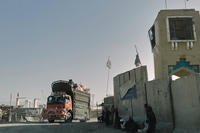At least 24 American service members, civilian Defense Department employees or military dependents have been turned away for emergency medical care from Japanese hospitals in the past two years, and four have died, according to Navy and Marine Corps leadership responsible for personnel in Japan.
In one case, a 7-year-old child who suffered a traumatic brain injury last January died from the oxygen deprivation she experienced as ambulance techs spent 35 minutes searching for a facility that would take her.
Several U.S. military facilities in Japan have emergency rooms, but none are designated as trauma centers, nor are they equipped to handle severe emergencies. According to a command investigation into the 7-year-old's death obtained by Military.com, military treatment facilities at Yokosuka and Okinawa since 2021 have not been able to handle severe injuries to troops or family members, including a gunshot wound, a rappelling accident, a severe car crash or a fall from a bunk bed that resulted in a liver laceration.
Adm. John Aquilino, commander of Indo-Pacific Command, directed U.S. Forces Japan in October to increase emergency medical care after a service member's spouse "died of an intracranial hemorrhage" when several hospitals in Tokyo denied her admittance, according to a portion of the military order obtained by Military.com.
An investigation into the death "indicated that latency in getting to an operating room was a likely contributor," noted the order.
Aquilino directed Army, Navy and Air Force commanders in Japan to "assess and provide planning estimates" to improve emergency care access for American patients covered by the Status of Forces Agreement, or SOFA, with the island nation.
"Upon completion of the planning assessments, follow-on orders will direct necessary actions to realize increased access to care," the order stated.
Patients who were turned away from Japanese hospitals and died also included a civilian Defense Department employee who suffered a heart attack and was denied care at 10 hospitals. He succumbed shortly before an 11th facility agreed to accept him, according to the command investigation into the girl's death by the III Marine Expeditionary Force.
"Denial of U.S. military and SOFA status personnel for emergency hospitalization in Japan is not new. SOFA members in Japan have been routinely denied access to emergency care, sometimes to fatal results," stated the investigation, published Feb. 23, 2023, by Lt. Gen. James Bierman, commander of Marine Forces Japan.
Emergency care in Japan differs significantly from the American approach, which includes dialing 911 and having an expectation that an ambulance will transport a patient to the nearest hospital or best-equipped facility for the situation.
In Japan, the emergency medicine specialty was not developed until 2010, and the country does not have enough emergency medicine physicians to cover ERs around the clock. If an emergency specialist is not on duty, the emergency treatment may involve a physician trained in another specialty who is not obligated to treat patients whose condition is outside their capabilities.
As a result, patients can be denied care or diverted. The situation not only affects U.S. and civilian personnel; it also applies to Japanese citizens. In December 2022, more than 8,000 patients were denied emergency services in Japan and another 16,000 were turned away in January 2023, according to the command investigation.
The approach proved tragic for the family of a Marine assigned to 3rd Marine Logistics Group at Camp Kinser on Okinawa. While on a shopping trip at a mall in Urasoe City, the Marine's 7-year-old daughter lost her balance on an escalator and fell more than 50 feet to a floor several levels down.
Suffering a severe head injury, the girl was conscious after her fall -- able to sit up and acknowledge her mother's presence by saying "Mommy" -- but began experiencing respiratory issues and low blood oxygen levels. She also received inadequate and even harmful treatment by a physician who had been dispatched to the scene from a nearby hospital.
Ambulance technicians then spent 35 minutes trying to find a facility that would treat the girl, including one with a pediatric intensive care unit that recommended that U.S. military physicians, with whom they were communicating, consider end-of-life care.
Doctors at that hospital did not want to accept the little girl, because they felt that "heroic measures should not be attempted and withdrawing care would be 'difficult for American people to do in Japanese hospitals due to cultural differences,'" according to the investigation.
The girl eventually was transported to U.S. Naval Hospital Okinawa, just nine minutes from where she fell. She was placed in the intensive care unit and monitored by an adult intensive care physician who told investigators they phoned a friend who specializes in pediatric intensive care to help provide critical care via telehealth from San Diego.
The girl was evacuated to Naval Medical Center San Diego, where she died on Feb. 15, 2023, after being removed from life support.
Concerns have been raised in the past several years over the availability of medical care for military personnel, families and civilian Department of Defense employees in Japan. In December 2022, the Defense Health Agency announced that it would treat civilian U.S. employees only on a space-available basis, and it notified longtime patients that they should plan to receive medical treatment from local providers if American military hospitals can't accommodate them.
Following a backlash from affected personnel, DHA clarified the policy in March 2023, announcing that civilians could continue to receive treatment for chronic conditions at military hospitals, but appointments for acute care would remain on a space-available basis.
In June, U.S. military medical staff at Kadena Air Base began informing pregnant service members, spouses and dependents that they should plan to deliver their babies at a facility other than Naval Hospital Okinawa -- a diversion caused by severe staffing shortages at the hospital.
The Defense Health Agency responded to the announcement from the 18th Medical Group at Kadena, saying the hospital had no plans to divert and deliveries would continue. DHA said the shortages were related to personnel moves and authorized a private health services contractor to offer signing bonuses and relocation assistance to attract labor and delivery nurses to Okinawa.
Shortages in the hospital and its affiliated clinics have become more pronounced since the changeover of hospital administration from the military services to the Defense Health Agency, according to Randi Wilson, a civilian Defense Department employee who advocates for military families and Defense Department civilians in Japan.
The move was related to health-care reforms that began nearly a decade ago to align the military medical commands to care for service personnel, while the DHA became responsible for the care of military family members and retirees.
But the recent deaths and lack of access to care has affected U.S. service members as well.
U.S. Forces Japan did not respond to a request from Military.com on Nov. 21 for a copy of Aquilino's order or to questions about the deaths of military patients in Japan. On Wednesday, after a second request for comment, the command sent an unattributed response, saying that it continues to "advocate along multiple lines of effort to address the ongoing medical concerns of the 110,000 personnel and family members in Japan."
According to the statement, commanders have conducted private meetings and working groups with decision-makers and participants in and outside of Japan.
"Advocacy for our personnel and families will not stop as long as there are access-to-care concerns to address and improvements to be made. Bottom line, service members and their families deserve the best medical care possible while serving so far from home," the statement read.
Officials added that they are working with the Defense Health Agency regarding the situation and referred additional questions to DHA.
DHA spokesman Peter Graves said Thursday that Assistant Secretary of Defense for Health Affairs Dr. Lester Martinez-Lopez, DHA and the military services are "keenly focused on primary, specialty and emergency care" in Japan and that assessments are ongoing.
"This comprehensive review will be provided to the under secretary for personnel and readiness once completed later this quarter," Graves wrote in an email.
The issues of staffing shortages at military medical facilities have garnered the attention of members of Congress, including Sen. Elizabeth Warren, D-Mass., and Rep. Frank Pallone, D-N.J., who sent letters last year to the Defense Department demanding fixes.
"Providing the best possible services to support service members and civilians deployed overseas enhances readiness, retention, and morale," Warren wrote in a letter in January 2023.
Any fixes, however, will come too late for a Marine family, who may have lost a daughter to traumatic injury even if the accident had happened in the U.S. As the mother sat by her little girl in the stationary ambulance for 35 minutes, she begged the technicians to take them to Naval Hospital Okinawa, according to the investigation.
In an interview with investigators, the mother shared the last words she had with her conscious daughter.
"I said, it's OK. [Mommy's] here with you. You're so beautiful. I love you so much, and it's OK if you need to go and be with Jesus, OK?" she said.













